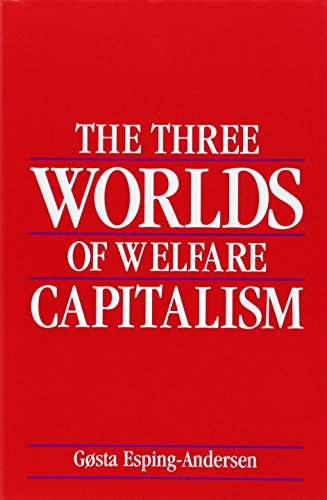The Three Worlds of Welfare Capitalism book
Par carmack sue le samedi, septembre 17 2016, 22:42 - Lien permanent
The Three Worlds of Welfare Capitalism. Gosta Esping-Andersen

The.Three.Worlds.of.Welfare.Capitalism.pdf
ISBN: 0691028575,9780691028576 | 256 pages | 7 Mb

The Three Worlds of Welfare Capitalism Gosta Esping-Andersen
Publisher: Princeton University Press
Historically, the creation of income tax in European countries has had a function of tax redistribution in relation to the creation of Welfare State, as a complementary answer to the social issue of industrial capitalism. The analysis of taxation and public finance, investigated the crisis of the tax State. 3After the First World War, Goldscheid (1917) and Schumpeter (1918), two Austrian founders of fiscal sociology, i.e. Esping-Andersen, Gospin (1990) The Three Worlds of Welfare Capitalism, Cambridge:Polity Press. In 1990, Gosta Esping-Andersen published a book, The Three Worlds of Welfare Capitalism which sought to explain the similarities of modern welfare states amidst their evident diversity. Deepening Democracy: Institutional Innovations in Empowered Participatory Governance (The Real Utopias Project, Vol. Fung, Archon, Erik Olin Wright, et al. One of the most influential writers on welfare states is Gosta Esping-Andersen. The Three Worlds of Welfare Capitalism. Lorenz, Walter (1994) Social Work in a Changing Europe, London-New York:Routledge. This mirrors Esping-Andersen's influential classification of three 'worlds of welfare capitalism' - liberal, conservative / Christian Democratic, and socialist/ social democratic. Despite the cogency of this argument, mainstream social policy theory continued to be largely gender blind, as epitomised by EA's seminal 1990 work The Three Worlds of Welfare Capitalism. Back in 1989, he wrote a book called The Three Worlds of Welfare Capitalism in which he categorised welfare states into three kinds. His preferred analytical construct is "motives, means and opportunities," a somewhat overused idea that he introduces in chapter 3 and uses throughout his empirical accounts. They lean to the sociopolitical side ..